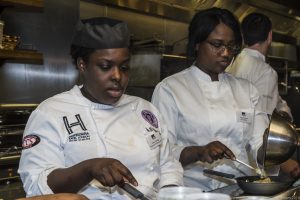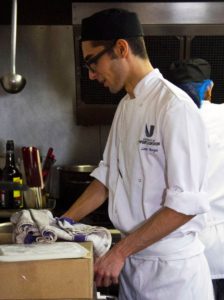Train to be a Chef – “It Can be Your Passport to the World” says Sadie Higham from University of West London

WHAT would Sadie Higham, Apprenticeship Administrator at the University of West London, say to a teenager who thinks being a chef isn’t that glamorous? Simple.
“It can be your passport to the world,” she says.
There are currently more than 100 apprentices in UWL’s Academy for Professional Skills, working in hospitality and catering with a view to becoming chefs and food servers – their predecessors have blazed a trail for them to follow.
“One of our apprentices from last year has just gone to work at Le Meurice in Paris with the Dorchester Collection.
“A lot of our students are looking to travel to places like Italy or Switzerland, places where they can learn more authentically in certain cuisines.
“All of those things a 14 year-old stood at a careers stand might not understand or realise. It is much more glamorous than people might think and, at the end of the day, it’s what you make of it.”
The way the University of West London prepares their catering students for the industry is by making their studies, which involve front of house skills as well as cooking, as realistic as possible from the very beginning, even for those studying full-time;
For those students who aren’t working in industry yet, the University has two fully-functioning restaurants that act as training venues for their students to practice – they offer both lunch and dinner and are very popular with local residents who reap the benefits of the skills the students are learning.
“We do place a lot of focus on practicality because that breeds employability,” says Sadie. “That’s the beauty of having training restaurants – they put our students in a ‘real world’ environment. People are coming in and paying real money for the food.”
 “We encourage the behaviours that people expect in a professional chef or front of house staff member from the word go.”
“We encourage the behaviours that people expect in a professional chef or front of house staff member from the word go.”
They are encouraged to create their own menus and learn about costing and procurement.
The university also does everything possible to reach students well before they reach the age of 16, which is the earliest they can take on one of the full-time courses.
Their Junior Chefs Academy for 13-16 year-olds has proved a very healthy breeding ground for students. For example, every year 11 student that was with them in last summer’s term is now studying with them either on a full-time course or on an apprenticeship.
Some of the students on Further Education or degree courses have been with UWL since they were 13, starting as a Junior Chef. Here again, a strong focus on the practical side of the industry serves the students well.
“We instil disciplines in them from that early stage and generally our students who come through from the Junior Chef courses do very well.”
Students come from all walks of life, however;
“They tend to know what their end goal is; some of them want to own a restaurant, some of them want to go into food development, some into nutrition but there are students who have absolutely no idea what to expect from their career – we guide them through their first steps into the industry.”
 Although many venues are struggling to fill chef vacancies at the moment, Sadie believes that, in an era when many believe there is no such thing as a job for life, catering offers more opportunities than some other industries.
Although many venues are struggling to fill chef vacancies at the moment, Sadie believes that, in an era when many believe there is no such thing as a job for life, catering offers more opportunities than some other industries.
“I would say first and foremost, I don’t think a lot of young people realise the prestige that is attached to the industry.
“The education that is provided in schools at the moment is great in places and lacking in others. The Junior Chefs Academy was set up not to counteract that but offer more balance to food education in schools.
“I’m often met with the attitude of ‘Oh, cooking, that’s not glamorous’ but I think with the rise of celebrity chefs on TV the image is constantly improving – there have always been celebrity chefs but now they’re younger, they’re sexier. People like Jamie Oliver and Gordon Ramsay have had a huge impact.
“I would also say that as a career it can serve you well and it can pay you well – if you do the training right. And that’s the onus we put on ourselves, to provide the right training environment for future industry leaders.”
For more information on Hospitality Apprentiships at the University of West London please click here: www.uwl.ac.uk











